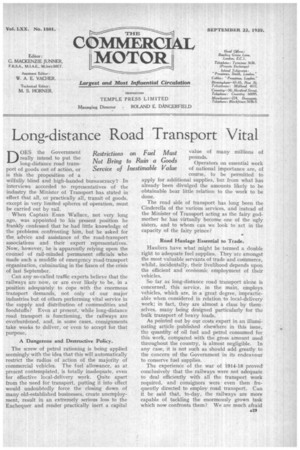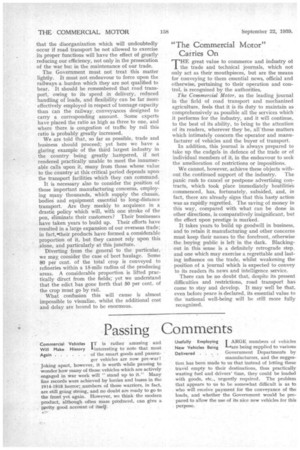Long-distance Road Transport Vital
Page 25

Page 26

If you've noticed an error in this article please click here to report it so we can fix it.
DOES the Government really intend to put the long-distance road transport of goods out of action, or is this the proposition of a wilfully blind and high-handed bureaucracy? In interviews accorded to representatives of the industry the Minister of Transport has stated in effect that all, or practically all, transit of goods, except in very limited spheres of operation, must be carried out by rail.
When Captain Euan Wallace, not very long ago, was appointed to his' present position he frankly confessed that he had little knowledge of the problems confronting him, but he asked for the advice and assistance of the road-transport associations and their expert representatives. Now, however, he is apparently relying upon the counsel of rail-minded permanent officials who made such a muddle of emergency road-transport organization, culminating in the fiasco of the crisis of last September.
Can any so-called traffic experts believe that the railways are now, or are ever likely to be, in a position adequately to cope with the enormous transport demands, not only of our major industries but of others performing vital service in the supply and distribution of commodities and foodstuffs? Even at present, while long-distance road transport is functioning, the railways are overburdened, and, in some cases, consignments take weeks to deliver, or even to accept for that purpose.
A Dangerous and Destructive Policy.
The screw of petrol rationing is being applied seemingly with the idea that this will automatically restrict the radius of action of the majority of commercial vehicles. The fuel allowance, as at present contemplated, is totally inadequate, even for effective local-delivery work. Quite apart from the need for transport, putting it into effect would undoubtedly force the closing down of many old-established businesses, create unemployment, result in an extremely serious loss to the Exchequer and render practically inert a capital value of many millions of pounds.
Operators on essential work of national importance are, of course, to be permitted to apply for additional supplies, but from what has already been divulged the amounts likely to be obtainable bear little relation to the work to be done.
The road side of transport has long been the Cinderella of the various services, and instead of the Minister of Transport acting as the fairy godmother he has virtually become one of the ugly sisters, and to whom can we look to act in the capacity of the fairy prince?
Road Haulage Essential to Trade.
Hauliers have what might be termed a double right to adequate fuel supplies. They are amongst the most valuable servants of trade and commerce, whilst, incidentally, their livelihood depends upon the efficient and economic employment of their vehicles.
So far as long-distance road transport alone is concerned, this service, in the main, employs vehicles, which are, in a great degree, impracticable when considered in relation to local-delivery work; in fact, they are almost a class by them. selves, many being designed particularly for the bulk transport of heavy loads.
As pointed out by our costs expert in an illuminating article published elsewhere in this issue, the quantity of oil fuel and petrol consumed for this work, compared-with the gross amount used throughout the country, is almost negligible. In any case, it is not such as should add greatly to the concern of the Government in its endeavour to conserve fuel supplies.
The experience of the war of 1914-18 proved' conclusively that the railways were not adequate to deal efficiently with all the transport work required, and consignors were even then frequently directed to employ road transport. Can it be said that, to-day, the railways are more capable of tackling the enormously grown task which now confronts them? We are much afraid that the disorganization which will undoubtedly occur if road transport be not allowed to exercise its proper functions will have the effect of greatly reducing our efficiency, not only in the prosecution of the war but in the maintenance of our trade.
The Government must not treat this matter lightly. It must not endeavour to force upon the railways a burden which they are not qualified to bear. It should be remembered that road transport, owing to its speed in delivery, reduced handling of loads, and flexibility can be far more• effectively employed in respect of tonnage capacity than can the railway. conveyaaces designed to carry a corresponding amount. Some experts have placed the ratio as high as three to one, and where there is congestion of traffic by rail this ratio is probably greatly increased.
We are told that, so far as possible, trade and business should proceed; yet here we have a glaring example of the third largest industry in the country being greatly hampered, if not rendered practically unable to meet the innumerable calls upon it, many from those whose value to the country at this critical period depends upon the transport facilities which they can command. It is necessary also to consider the position of those important manufacturing concerns, employing many thousands, which supply the chassis, bodies and equipment essential to long-distance transport. Are they meekly to acquiesce in a drastic policy which will, with one stroke of the pen, eliminate their customers? Their businesses have taken years to build up. Their efforts have resulted in a large expansion of our overseas trade; in fact,stheir products have formed a considerable proportion of it, but they cannot rely upon this alone, and particularly at this juncture. Diverting from the general to the particular, we may, consider the case of beet haulage. Some 80 per cent. of the total crop is conveyed to refineries within a I5-mile radius of the producing areas. A considerable proportion is lifted practically direct from the fields; yet we understand that the edict has gone forth that 50 per cent, of the crop must go by rail. What confusion this will cause is almost impossible to visualize, whilst the additional cost and delay are bound to -be enormous. "The Commercial Motor)) Carries On THE great value to commerce and industry of the trade and technical journals, which not only act as their mouthpieces, but are the means for conveying to them essential news, official and otherwise, pertaining to their operation and control, is recognized by the authorities.
The Commercial Motor, as the leading journal in the field of road transport and mechanized agriculture, feels that it is its duty to maintain as comprehensively as possible all the services which it performs for the industry, and it will continue, to the best of its ability, to bring to the attention of its readers, wherever they be, air those matters which intimately concern the operator and manufacturer of vehicles and the buyer of transport.
In addition, this journal is always prepared to take up the cudgels in defence of the trade or of individual members of it, in the endeavour to seek the amelioration of restrictions or impositions.
We cannot, however, achieve these objects without the continued support of the industry. The panic rush to cancel or postpone advertising contracts, which took place immediately hostilities commenced, has, fortunately, subsided, and, in fact, there are already signs that this hasty action was as rapidly regretted. The saving of money in this way, compared with what can be done in other directions, is comparatively insignificant, but the effect upon prestige is marked.
It takes years to build up goodwill in business, and to retain it manufacturing and other concerns must keep their names to the forefront, otherwise the buying public is left in the dark. Blackingout in this sense is a definitely retrograde step, and one which may exercise a regrettable and lasting influence on the trade, whilst weakening the position of a journal which is expected to convey to its readers its news and intelligence service.
There can be no doubt that, despite its present difficulties and restrictions, road transport has come to stay and develop. It may well be that, even before peace is declared, its essential value to the national well-being will be still more fully recognized.




































































